Is Your Coffee Leaving You Feeling Drained and Tired?
If you notice a persistent decline in your energy levels despite your regular caffeine intake, the issue may not lie with your coffee. Instead, it could be linked to your Vitamin B12 levels.

Vitamin B12, scientifically known as cobalamin, is a water-soluble vitamin that is fundamental to numerous crucial bodily functions, far beyond merely alleviating fatigue. This vital nutrient is essential for the replication and repair of your DNA, helps maintain the protective myelin sheath surrounding your nerves, and plays a key role in the production of healthy red blood cells, which are responsible for transporting oxygen throughout your body. Additionally, it is crucial in converting the food you consume into usable energy, ensuring that you remain active, vibrant, and healthy.
While you might rely on coffee as your primary source of energy, when your vitamin B12 levels are at their peak, this nutrient can significantly outshine the energising effects of caffeine. Continue reading to uncover how this crucial vitamin can revitalise you from the inside out.
Prefer to listen instead? Click below:
However, realising these benefits hinges on proper absorption. Vitamin B₁₂ forms a complex with intrinsic factor in your stomach, which is essential for your intestines to absorb this critical combination effectively.
Inadequate intake or poor absorption can result in low energy levels, anaemia, nerve damage, and hindered DNA repair processes. This comprehensive guide will delve into how vitamin B12 enhances your health, the repercussions of deficiency, factors affecting absorption, and practical strategies—including liposomal and sublingual supplements—to optimise your B12 levels, especially when traditional approaches may fall short.
Exploring the Vital Biological Functions of Vitamin B12
Unraveling the Processes Behind DNA Synthesis and Cell Division
Vitamin B12 serves a crucial role as a cofactor in a significant biochemical pathway: it facilitates the transformation of homocysteine (a common amino acid) into methionine, a compound essential for synthesising S-adenosylmethionine (SAMe). SAMe is fundamental for donating methyl groups, which are essential for:
- Ensuring accurate construction and replication of our DNA, allowing cells to divide correctly.
- Regulating gene expression by activating or silencing genes as required.
To illustrate, think of homocysteine as unshaped clay, methionine as the mould, and SAMe as the sculptor who shapes the clay into its final form. Without adequate vitamin B12, the sculptor struggles to produce the desired outcome, leaving our DNA and cellular replication processes vulnerable and compromised.
The Critical Role of Vitamin B12 in Producing Red Blood Cells
Your bone marrow operates like a bustling factory dedicated to producing red blood cells. Within this dynamic environment, Vitamin B12 acts as the instructional manual, guiding the growth and division processes of these cells. When B12 levels fall short, the factory produces oversized, immature cells that lack the capability to effectively transport oxygen. This deficiency results in a reduction of healthy red blood cells, leading to symptoms such as chronic fatigue due to insufficient oxygen delivery, pale skin, and breathlessness during physical exertion.
Essential Contributions of Vitamin B12 to Nervous System Function and Myelin Sheath Integrity
Myelin is the protective covering enveloping your nerve fibres, akin to the insulation that safeguards electrical wiring. Vitamin B₁₂ is indispensable for creating and maintaining this protective sheath. When B₁₂ levels drop, the myelin sheath may deteriorate or thin, resulting in slower or disrupted nerve impulses.
Identifying Symptoms of Myelin Damage
When myelin is compromised, you may experience one or more of the following symptoms: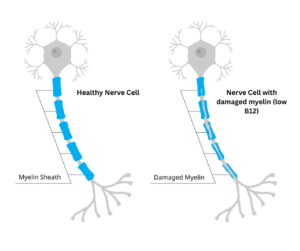
-
- Paresthesia: Sensations of tingling or “pins and needles” in your extremities.
- Muscle Weakness: Difficulty lifting objects or climbing stairs.
- Balance & Coordination Issues: Feelings of unsteadiness, clumsiness, or trouble with precise motor tasks.
- Visual Disturbances: Experiencing blurred vision, double vision, or optic neuritis.
- Bladder and Bowel Dysfunction: Increased urgency, frequency, or incontinence.
- Neuropathic Pain: Unpleasant sensations such as burning or shooting pains along nerve pathways.
- Cognitive and Mood Changes: Memory issues, concentration problems, depression, or irritability.
Consider it like sending an email with a poor Wi-Fi connection; the message may arrive delayed or distorted. Low B₁₂ levels resemble inadequate insulation on a wire: nerve signals travel slowly or erratically, leading to sensations of tingling, pain, balance issues, vision problems, or mental fog.
Boosting Energy Metabolism and Homocysteine Regulation with Vitamin B12
Vitamin B12 is pivotal in converting specific nutrients into energy. It aids in transforming a molecule called methylmalonyl-CoA into succinyl-CoA, which directly enters the Krebs cycle. This cycle is the pathway cells use to generate energy in the form of adenosine triphosphate (ATP). Without adequate B12, this reaction ceases, diminishing the cells’ capacity to produce the ATP necessary for daily functions and overall vitality.
In addition to energy generation, B12 significantly supports cardiovascular health by managing homocysteine levels. Homocysteine is an amino acid that, when present in excessive amounts, can damage blood vessels and heighten the risk of heart disease. Through a process regulated by B12, homocysteine is converted back to methionine, preventing its harmful accumulation. Essentially, think of B12 as the spark plug that keeps your cellular “engine” running smoothly and the maintenance crew that protects your blood vessels from damage.
Understanding the Health Consequences of Vitamin B12 Deficiency
When vitamin B12 levels decline, the body’s essential systems may start to malfunction. In the bloodstream, a lack of B12 disrupts the normal production of red blood cells, leading to persistent fatigue, pale skin, and shortness of breath. Furthermore, nerve function can deteriorate: prolonged or severe deficiencies may result in irreversible nerve damage, impacting coordination and vision.
These effects extend beyond physical symptoms. Many people report mood disturbances when B₁₂ levels are low, which may present as irritability, depression, or memory lapses. If left unaddressed, persistently elevated levels of the amino acid homocysteine (which normal B₁₂ helps recycle) can lead to vascular damage over time, increasing the risk of cardiovascular complications.
Investigating Exhaustion: Exploring the Dual Factors
Two primary factors contribute to the exhaustion you may be experiencing. Firstly, a decrease in healthy red blood cells means less oxygen is available for your muscles and brain, making even simple tasks feel labour-intensive. Secondly, B12’s vital role in energy metabolism, which feeds into the Krebs cycle to produce ATP, becomes compromised, leaving your cells devoid of necessary fuel. Together, these challenges transform routine activities into overwhelming tasks, making fatigue one of the earliest and most common indicators of deficiency. Prompt intervention for B12 deficiency is crucial for restoring energy levels, nerve health, and safeguarding long-term heart and brain function.
Identifying Dietary Sources Rich in Vitamin B12
Vitamin B12 is predominantly found in animal-derived foods; however, there are several fortified alternatives that make it accessible for individuals adhering to plant-based diets. Below is a quick reference guide to assist you in choosing B12-rich food options:
Top Animal-Based Food Sources of Vitamin B12
Most of our natural B12 is sourced from animal products. These foods not only offer high levels of cobalamin but also provide other essential nutrients such as protein, iron, and omega-3 fatty acids:
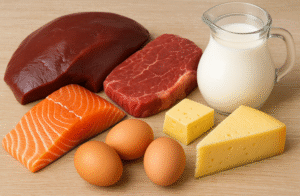 Meat & Organ Meats: Beef, lamb, and particularly liver, contain the highest concentrations of B12—just a small serving of liver provides several times the daily requirement.
Meat & Organ Meats: Beef, lamb, and particularly liver, contain the highest concentrations of B12—just a small serving of liver provides several times the daily requirement.
Fish & Seafood: Fatty fish like salmon and trout, alongside shellfish such as clams and oysters, are excellent sources.
Dairy Products: Foods like milk, yogurt, and cheese contain moderate amounts of B12 and can easily enhance your intake.
Eggs: The yolk contains B12 in smaller amounts compared to meat and fish.
Fortified Food Alternatives for Vitamin B12
For individuals avoiding animal products, fortified foods can effectively help bridge the nutrition gap:
- Plant Milk: Many varieties of soy, almond, and oat milk are enriched with vitamin B12. Always check the labels to ensure they contain cyanocobalamin or methylcobalamin.
- Breakfast Cereals & Nutritional Yeast: Opt for brands that fortify their products with B12, typically indicated on the vitamins panel.
Comprehending the Absorption and Bioavailability of Vitamin B12
Have you ever wondered why taking a B12 pill doesn’t always translate to an energy boost? It all comes down to a complex series of actions occurring within your digestive system, where B12 must switch binding partners and locations to achieve effective absorption. Any disruption along this journey can leave you feeling fatigued.
Initial Steps: The Role of Your Mouth and Stomach in B12 Absorption
When you consume foods containing B12, the vitamin binds to specific “R-proteins” in your saliva. Next, stomach acid aids in releasing B₁₂ from food, allowing it to interact with intrinsic factor (IF). Intrinsic Factor is a glycoprotein (a protein bonded to a sugar). It is produced by specialized parietal cells situated in the body and fundus regions of the stomach. IF is essential for the transportation and absorption of vitamin B12.
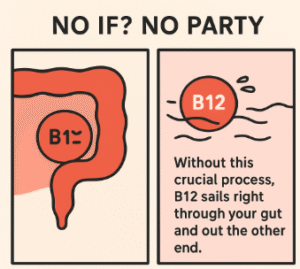 The Significance of Intrinsic Factor in B12 Absorption
The Significance of Intrinsic Factor in B12 Absorption
Without this crucial mechanism, B12 simply passes through your digestive system and is eliminated. Once your B12–IF complex arrives at the ileum (the final section of your small intestine), receptor proteins act as “doormen” that facilitate entry into your cells. However, it’s important to note that there are a limited number of doormen available at any given time, meaning large doses of B₁₂ can overwhelm this absorption system.
After this, B12 binds to a transporter known as transcobalamin II, delivering it to various cells throughout your body. This can occur in the liver, where it is stored, or in the bone marrow, where it supports the formation of red blood cells. The vitamin is also transported to the nervous system to ensure that nerve function remains intact.
Factors That Can Hinder Your Absorption of Vitamin B12
- Low Stomach Acid or Intrinsic Factor Levels: Conditions like atrophic gastritis or long-term use of antacids can disrupt the initial B12–IF collaboration.
- Medications: Drugs such as proton pump inhibitors, H₂ blockers, and metformin can interfere with the absorption process.
- Gastrointestinal Surgery: Procedures like bypass surgeries or the removal of the last segment of the small intestine (where B12 is absorbed) can eliminate crucial absorption areas in the gut.
- Age-Related Factors: Unfortunately, our stomachs produce less IF as we age, leading to naturally reduced absorption capabilities.
The key takeaway? A robust B12 strategy goes beyond mere dosage; it’s about your body’s ability to absorb it effectively. Next, we’ll explore why consuming high-dose supplements doesn’t always lead to improved status—and what steps you can take to address this.
Establishing the Recommended Daily Allowance for Vitamin B12
Health authorities usually recommend a daily intake of approximately around 2.4 µg of Vitamin B12 for most adults. However, recent studies suggest that targeting at least 2.5 µg per day is wise to ensure optimal levels, particularly when considering variations in absorption efficiency and increased requirements during pregnancy or among older adults. This moderate target helps maintain sufficient B12 reserves and supports all essential physiological processes we’ve discussed.
It’s essential to note that pregnant or breastfeeding women require a higher intake of up to 2.8 µg/day to support the development of the newborn’s nervous system. Always consult with a healthcare professional to tailor your intake to your unique health needs.
Understanding Why Increased Intake Doesn’t Automatically Improve B12 Status
You might think that taking more vitamin B12 will always yield better results, but your digestive system has a built-in “speed limit.” Active absorption through intrinsic factor can only manage about 1.5–2 µg of B12 per meal. Any excess must rely on passive diffusion, which accounts for a minimal fraction of your intake. Even if you consume a high-dose supplement, much of the vitamin may be excreted rather than absorbed. In simpler terms, you could be wasting money on ineffective doses.
Taking excessive B12 in supplement form does not resolve absorption issues. Those passive pathways are so inefficient that only 1.5–2% of a 1,000 µg tablet may reach your bloodstream. If intrinsic factor function or receptor availability is compromised, increasing your B12 intake will not fix the fundamental issue.
Key Takeaways to Remember:
- Active versus Passive Absorption: Active uptake via intrinsic factor is saturable; once this mechanism is full, any additional B12 must rely on ineffective passive diffusion.
- Avoiding Waste: High oral doses can lead to unnecessary excretion, providing minimal additional benefit when absorption is impaired.
To genuinely enhance your B12 status, focus on optimising absorption—whether by addressing stomach acid and intrinsic factor production, selecting formulations that bypass the gut (like sublingual or liposomal), or considering injections when medically indicated.
Clinical Testing and Best Practices for Discussing Vitamin B12 with Your GP
Many individuals assume that a simple blood test and a vitamin B12 injection from their physician will resolve any deficiency. However, the reality can be much more intricate. Standard serum B12 tests assess total circulating cobalamin, with a “normal” range typically falling between 200–900 pg/mL (150–670 pmol/L). Nevertheless, it is entirely possible to experience a functional B12 deficiency even when your levels are within this range.
- Beyond Serum B12 Levels: Since serum levels do not provide a comprehensive overview, specialists often evaluate methylmalonic acid (MMA) or homocysteine levels. Elevated MMA serves as a warning sign of genuine cellular B12 deficiency.
- The Injection Challenge: Many general practitioners reserve intramuscular B12 injections for patients whose serum levels fall below the lower limit. If you present with symptoms but your reading is 220 pg/mL, you may be told your levels are “acceptable” and sent home without treatment. This can be particularly frustrating if the same doctor prescribes a proton pump inhibitor that effectively reduces absorption, addressing one issue while inadvertently causing another. Finding one solution while inadvertently causing another.
- Symptom Awareness Versus Numerical Values: Symptoms such as fatigue, tingling sensations, or cognitive fog warrant attention, regardless of whether your levels remain within the “normal” limits. Advocating for your health may require requesting functional marker tests or trialing supplements.
Exploring Effective Therapeutic Forms of Vitamin B12
You still have viable options even if your GP does not provide injections or if you are unable to discontinue taking acid-blockers like PPIs due to severe reflux. Two oral methods stand out for bypassing or enhancing your gut’s limited uptake:
Harnessing the Benefits of Liposomal Vitamin B12
Liposomal B12 encapsulates each vitamin molecule within tiny fat bubbles, protecting it from stomach acid while enhancing its absorption through the intestinal lining. This method can significantly improve uptake, even when intrinsic factor levels are low or if you are on proton pump inhibitors. Typical servings range from 500–2,000 µg, with many users reporting noticeable improvements in energy and symptom relief within weeks.
Implementing Sublingual Vitamin B12 for Direct Systemic Absorption
Sublingual tablets, liquids, or sprays dissolve beneath your tongue, allowing the nutrient to enter your bloodstream directly. This method bypasses the stomach, removing concerns regarding absorption limitations. Clinical studies indicate that sublingual B12 can effectively elevate serum levels, making it an excellent solution for individuals facing malabsorption, those using PPIs, or those who prefer not to stop heartburn medications.
Reasons These Forms Are Effective When Injections Fall Short
- Bypassing the Stomach: Both methods reduce reliance on stomach acid and intrinsic factor.
- Convenience and Comfort: No needles or doctor visits are necessary; they can be taken at your convenience.
- Flexible Dosing: You can adjust the frequency and dosage to align with your symptoms and bloodwork.
Strategies for Managing Impaired Absorption of Vitamin B12
Even with suitable supplements, absorption challenges can continue. Here are some strategies to maximise your chances:
Optimising Timing and Context for Improved Absorption
Sublingual B12 is most effective when taken on an empty stomach, ideally first thing in the morning or at least two hours after a meal. This allows the vitamin to make direct contact with the tissues under your tongue without food interference. Liposomal B12 absorbs best when consumed with a small amount of healthy fat, such as avocado or a handful of nuts. This helps the lipid bubbles merge with your gut lining, enhancing absorption.
Divide and Conquer Your Dosing Strategy
Rather than taking one large dose of sublingual or liposomal B12, consider splitting it into smaller doses, such as 250–500 µg two to three times daily. This can enhance overall absorption through both active and passive mechanisms.
Improving Your Stomach Environment for Optimal Absorption
To facilitate the release of B12 from food, try sipping a teaspoon of apple cider vinegar or fresh lemon juice in water before meals; this mild acidity may stimulate gastric juice production and free up more vitamins for absorption. Additionally, taking a broad-spectrum digestive enzyme supplement can help break down proteins fully, releasing the B12 that’s bound within the protein and preparing it for uptake.
Implementing Lifestyle and Dietary Adjustments for Enhanced Gut Health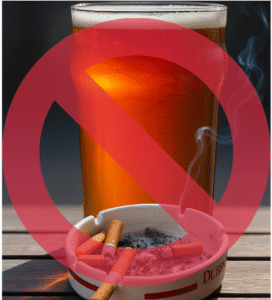
Beyond supplementation, simple lifestyle and dietary modifications can promote B12 absorption and overall gut health. Work with your healthcare provider to taper or reduce your PPI dosage if feasible. Alternatively, consider switching to milder H₂ blockers. Including fermented foods—like yogurt, kefir, sauerkraut, or kimchi—can support beneficial gut bacteria, which may aid in producing intrinsic factor.
Moreover, staying well-hydrated and consuming a fibre-rich diet comprising fruits, vegetables, and whole grains supports proper digestion and transit time, giving vitamin B12 ample opportunity for absorption. Regular, moderate exercise fosters healthy gut motility, and practising stress management techniques, such as meditation or yoga, can help balance stomach acid production. It is also advisable to limit alcohol and smoking to safeguard the gut lining, ensuring it remains healthy and capable of effectively absorbing vitamin B12.
By integrating targeted supplement forms with these practical strategies, you can overcome common absorption barriers and maintain optimal B12 levels.
Selecting High-Quality Vitamin B12 Supplements
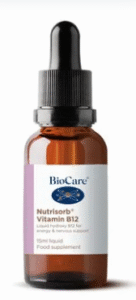 When searching for supplements, choose brands that undergo third-party testing, ensuring clear labelling of the form and dosage of B12. One reputable option is Biocare, a trusted supplement manufacturer with over 30 years of experience. Their sublingual liquid B12 is packaged in a convenient dropper bottle, providing 500 µg per serving as a blend of methylcobalamin and adenosylcobalamin, the most bioactive forms of the vitamin. This liquid is created in a purified water base with no unnecessary additives. You can take it under your tongue or mix it into beverages, making it easy to adjust the dosage as required.
When searching for supplements, choose brands that undergo third-party testing, ensuring clear labelling of the form and dosage of B12. One reputable option is Biocare, a trusted supplement manufacturer with over 30 years of experience. Their sublingual liquid B12 is packaged in a convenient dropper bottle, providing 500 µg per serving as a blend of methylcobalamin and adenosylcobalamin, the most bioactive forms of the vitamin. This liquid is created in a purified water base with no unnecessary additives. You can take it under your tongue or mix it into beverages, making it easy to adjust the dosage as required.
This high-potency formula supports mental health, energy production, and alleviates feelings of tiredness and fatigue. It is particularly suitable for anyone facing digestive or absorption challenges. Each bottle provides an approximate supply for 43 days with a recommended intake of six drops daily. Biocare’s vitamin B12 liquid is also packaged in recyclable materials, reflecting their commitment to environmental sustainability. Plus, readers can enjoy an exclusive 10% lifetime discount using our code: P8824.
Article Source: Unlock the Power of Vitamin B12: A Guide to Energy and Optimal Absorption appeared first on https://janestevensnutrition.com
The Article Vitamin B12 Benefits: Your Guide to Energy and Absorption Was Found On https://limitsofstrategy.com



